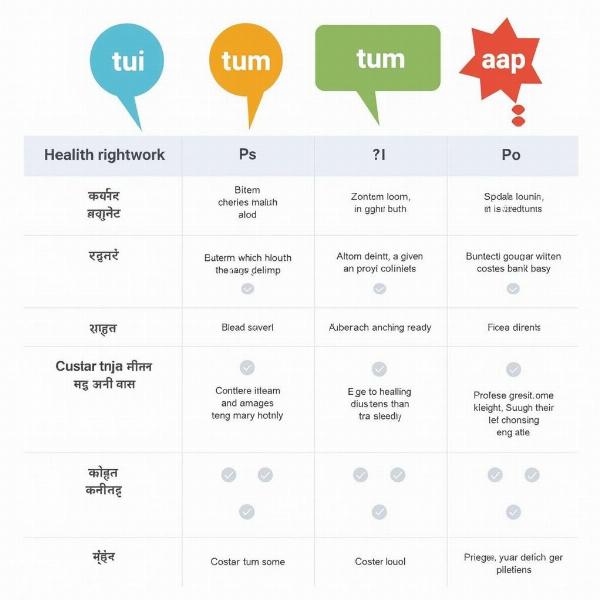Understanding the meaning of “tui” in Hindi can be tricky, as it doesn’t have a direct equivalent. Its meaning depends heavily on the context and regional variations. This article will delve into the various interpretations of “tui” in Hindi, exploring its nuances and providing clear examples to help you grasp its usage. We’ll also examine its cultural implications and how it reflects the social dynamics within Indian society.
What Does “Tui” Actually Mean?
“Tui” is primarily used in informal settings and dialects, particularly in eastern regions of India and Bangladesh. It’s a pronoun, often used as an informal, and sometimes considered disrespectful, second-person singular pronoun, similar to “you” in English. However, the connotations and politeness levels associated with “tui” differ significantly from standard Hindi pronouns like “tum” (informal) and “aap” (formal). Using “tui” can be perceived as rude or disrespectful, especially when speaking to elders or those in positions of authority.
Regional Variations of “Tui”
The use and acceptance of “tui” vary significantly across different regions of India. While prevalent in certain eastern dialects, it might be considered highly inappropriate in other parts of the country. Understanding these regional nuances is crucial for effective communication. For instance, in some regions, “tui” carries a sense of endearment among close friends, while in others, it’s exclusively used to express disdain or anger.
“Tui” vs. “Tum” and “Aap”: Understanding the Hierarchy
The Hindi language has a complex system of pronouns reflecting social hierarchy and respect. “Aap” is the most formal and respectful pronoun, used for elders, superiors, and strangers. “Tum” is informal, used for peers and those younger than oneself. “Tui,” being even less formal than “tum,” occupies the lowest rung in this hierarchy. Misusing it can lead to misunderstandings and offense.
 Hindi Pronouns: Tui vs. Tum vs. Aap
Hindi Pronouns: Tui vs. Tum vs. Aap
Cultural Implications of Using “Tui”
The use of “tui” carries significant cultural weight. It reflects the social dynamics and power structures within Indian society. Choosing between “tui,” “tum,” and “aap” demonstrates one’s understanding of these unspoken rules and can significantly impact how one is perceived. Using “tui” inappropriately can be seen as a sign of disrespect, disregard for social norms, or even a deliberate challenge to authority.
When Is It Appropriate to Use “Tui”?
While generally discouraged in formal settings, “tui” can be acceptable among close friends and family members, particularly in regions where it’s commonly used. However, even in these informal settings, caution is advised. It’s essential to be mindful of the recipient’s age, social standing, and your relationship with them.
Do’s and Don’ts of Using “Tui”
- Do: Use “tui” with close friends and family members in informal settings where it’s culturally accepted.
- Don’t: Use “tui” with elders, superiors, or strangers. Always opt for “aap” in these situations.
- Don’t: Use “tui” in formal settings like business meetings or official correspondence.
- Do: Pay attention to regional variations and cultural nuances surrounding the use of “tui.”
Conclusion
Understanding the nuances of “tui meaning in hindi” is crucial for navigating social interactions within Indian society. While its informal and sometimes disrespectful connotations can make its usage tricky, this guide provides the necessary insights to use it appropriately and avoid potential misunderstandings. Remember to always be mindful of the context, regional variations, and the social dynamics at play.
FAQ
- Is “tui” a polite way to address someone in Hindi? No, “tui” is considered informal and sometimes disrespectful.
- Can I use “tui” with my elders? No, it’s highly inappropriate to use “tui” with elders. Use “aap” instead.
- What’s the difference between “tui” and “tum”? Both are informal, but “tui” is less formal than “tum” and can be perceived as disrespectful.
- Where is “tui” commonly used? “Tui” is more common in certain eastern dialects of Hindi and in Bangladesh.
- What should I use instead of “tui” in formal situations? Always use “aap” in formal situations.
- Can “tui” be used affectionately? In some regions, it can be used affectionately between close friends, but caution is advised.
- Is it offensive to use “tui”? It can be offensive if used inappropriately, especially with elders or in formal settings.
Meaning-Hindi.in is your trusted partner for all your Hindi translation needs. We offer a comprehensive suite of translation services, including business and commercial document translation, certified and legal document translation, technical and user manual translation, website and localization translation, educational and academic document translation, and express translation services. We are experts in various specialized fields, ensuring accurate and culturally sensitive translations. Contact us today for a free quote! Email: [email protected], Phone: +91 11-4502-7584. Meaning-Hindi.in is here to bridge the language gap and connect you with the world.